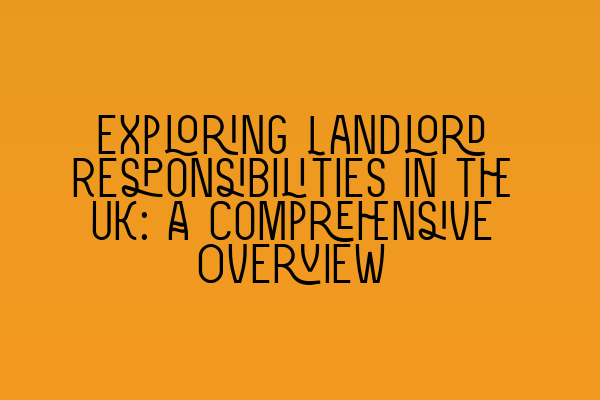Exploring Landlord Responsibilities in the UK: A Comprehensive Overview
As a landlord in the UK, it is crucial to understand and fulfill your responsibilities to ensure a smooth and legally compliant tenancy. From maintaining the property to adhering to health and safety regulations, there are various obligations that you must meet. This article aims to provide a comprehensive overview of landlord responsibilities in the UK, empowering you to be a responsible and knowledgeable landlord.
1. Property Maintenance and Repairs
One of the primary responsibilities of a landlord is to maintain the property in a safe and habitable condition. This includes ensuring that the structure, plumbing, heating, and electrical systems are in good working order. Regular inspections and addressing any necessary repairs promptly are essential. Failure to fulfill this duty can result in potential hazards for your tenants and legal repercussions for you as a landlord.
For more information on property maintenance, you can refer to our related article on property maintenance for landlords.
2. Gas and Electrical Safety
Landlords have specific responsibilities when it comes to gas and electrical safety in their rental properties. All gas appliances and flues must be checked by a Gas Safe registered engineer annually, and a gas safety certificate should be provided to tenants. Similarly, electrical installations and appliances must be safe and regularly tested by a qualified professional. It is essential to keep records of these safety checks to demonstrate compliance with the law.
For a more detailed understanding of the obligations around gas and electrical safety, explore our article on landlord responsibilities for gas and electrical safety.
3. Fire Safety
Ensuring fire safety is a critical responsibility for landlords. The property must have appropriate fire precautions in place, including smoke alarms on each floor and carbon monoxide detectors (if applicable). Fire-resistant furnishings and additional fire safety measures may also be necessary, depending on the property type and licensing requirements. Conducting regular fire risk assessments and maintaining fire safety equipment are vital aspects of fulfilling this duty.
Learn more about the specific fire safety obligations by reading our article on fire safety requirements for landlords.
4. Tenancy Agreements and Deposits
As a landlord, it is essential to have a legally binding tenancy agreement in place with your tenants. This agreement outlines the terms and conditions of the tenancy, including rent payment terms, notice periods, and other important details. Additionally, if you take a tenancy deposit, you must protect it in a government-approved deposit protection scheme and provide the required information to your tenants within the specified timeframe.
Discover more about creating tenancy agreements and managing deposits by exploring our article on essential elements of tenancy agreements and deposit protection.
5. Right to Rent Checks
Under UK law, landlords have an obligation to carry out right to rent checks on all prospective tenants before granting a tenancy. These checks ensure that individuals have the legal right to reside in the UK. Failing to perform these checks or knowingly renting to someone without the right to rent can lead to severe penalties and legal consequences. It is crucial to familiarize yourself with the process of conducting right to rent checks and keeping the necessary records.
To learn more about right to rent checks and how to comply with the law, refer to our detailed article on right to rent responsibilities for landlords.
6. Health and Safety Obligations
As a responsible landlord, you must ensure that your rental property meets all relevant health and safety standards. This includes maintaining a safe environment, addressing potential hazards, and conducting regular risk assessments. You should also provide adequate sanitation, ventilation, and access to amenities such as water and heating. By meeting these obligations, you create a healthy and comfortable living space for your tenants, reducing the risk of legal issues.
For a comprehensive understanding of health and safety obligations, read our article on landlord responsibilities for health and safety.
7. Evictions and Ending Tenancies
In certain circumstances, you may need to evict a tenant or end a tenancy agreement. However, it is crucial to follow the correct legal procedures to avoid breaching the tenant’s rights and facing potential legal action. Familiarize yourself with the different types of eviction procedures, notice periods, and grounds for eviction. Seek legal guidance if you are unsure or require assistance in navigating this complex process.
To delve deeper into the topic of evictions and ending tenancies, read our detailed article on eviction procedures and tenant rights.
Conclusion
Being a landlord in the UK comes with a set of responsibilities that should not be taken lightly. By understanding and fulfilling these obligations, you not only protect your tenants’ rights but also safeguard your legal position as a landlord. This comprehensive overview has provided insights into various aspects of landlord responsibilities, from property maintenance and safety checks to tenancy agreements and ending tenancies.
For further guidance and specialized support in property law and land law, SQE Property Law & Land Law can provide expert advice and legal services. Contact us today to ensure that you stay compliant and well-informed as you navigate the complexities of being a landlord in the UK.
